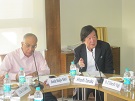The VIF hosted Mr. Hitoshi Tanaka, Japan’s former Deputy Minister of Foreign Affairs and currently Chairman of the Institute for International Strategy at the Japan's Research Institute, on 17 Oct 2014, for an interaction on the Japanese perception of strategic developments in Asia-Pacific including bilateral relations between India and Japan. He was accompanied by Japan’s Ambassador to India H.E. Mr.Takeshi Yagi. The VIF faculty who interacted with Mr Hitoshi Tanaka included, Lt Gen (Retd) Ravi Sawhney, Admiral (Retd) Raman Puri, and a group of former ambassadors – Mr. Satish Chandra, Mr. Rajiv Sikri, Mr. R Rajagopalan and Mr TCA Rangachari. At the outset, Mr. Rajiv Sikri, chairing the interactive session, expressed his satisfaction over the steady progress in bilateral relations over the last ten years. Incidentally, both Ambassador Rajiv Sikri and Mr. Hitoshi Tanaka were instrumental in crafting a common strategy for the development of Indo-Japan relations back in 2004.
 Reciprocating the Chair's views, Mr. Tanaka said that as democratic countries both Japan and India had many shared strategic interests in the region, adding further he welcomed India's emergence, particularly in the context of Asia-Pacific. In so far as developments in Asia-Pacific are concerned, he said the region is presently in the throes of tumultuous change, marked by growing economic inter-dependence, changing power balance and uncertainty amid rising sense of nationalism across the region. Much of the region’s uncertainty however could be attributed to China. Referring to China's muscle-flexing over Senkaku Island, the Minister said it has led to a wave of anti-China sentiments across Japan. He outlined the recent national security initiatives undertaken by Mr. Abe's government in Japan. Beside the issue of maritime security in East Asia, the growing regional economic inter-dependence, especially in the context of Asia-Pacific Economic Cooperation (APEC) and the recently constituted New Development Bank, was also substantially discussed during the session which lasted over two hours.
Reciprocating the Chair's views, Mr. Tanaka said that as democratic countries both Japan and India had many shared strategic interests in the region, adding further he welcomed India's emergence, particularly in the context of Asia-Pacific. In so far as developments in Asia-Pacific are concerned, he said the region is presently in the throes of tumultuous change, marked by growing economic inter-dependence, changing power balance and uncertainty amid rising sense of nationalism across the region. Much of the region’s uncertainty however could be attributed to China. Referring to China's muscle-flexing over Senkaku Island, the Minister said it has led to a wave of anti-China sentiments across Japan. He outlined the recent national security initiatives undertaken by Mr. Abe's government in Japan. Beside the issue of maritime security in East Asia, the growing regional economic inter-dependence, especially in the context of Asia-Pacific Economic Cooperation (APEC) and the recently constituted New Development Bank, was also substantially discussed during the session which lasted over two hours.
 The interaction, however, also sought to address the classical dilemma faced globally by a number of countries including Japan and India, whether to view China's consistent rise as an opportunity or a threat. While Mr. Tanaka believed that regional tension would be substantially eased by growing economic inter-dependence, the VIF faculty argued that regional countries needed to take a cue from China, overtly economically inter-dependent but unwilling to let its economic interests over-shadow its security interests. In this context, the question of sustainability of the Chinese economy also cropped during the discussion. The VIF faculty argued that India offered safer investment opportunities to countries like Japan, as compared to China. The ‘Make in India’, plan presently on the anvil, offers to the global manufacturers the ease of doing business in India, as such it needs to be exploited to the hilt by global investors. The interaction concluded with both sides expressing their satisfaction at the frank and cordial exchanges of ideas and hoped to carry the dialogue process forward in more meaningful ways in future.
The interaction, however, also sought to address the classical dilemma faced globally by a number of countries including Japan and India, whether to view China's consistent rise as an opportunity or a threat. While Mr. Tanaka believed that regional tension would be substantially eased by growing economic inter-dependence, the VIF faculty argued that regional countries needed to take a cue from China, overtly economically inter-dependent but unwilling to let its economic interests over-shadow its security interests. In this context, the question of sustainability of the Chinese economy also cropped during the discussion. The VIF faculty argued that India offered safer investment opportunities to countries like Japan, as compared to China. The ‘Make in India’, plan presently on the anvil, offers to the global manufacturers the ease of doing business in India, as such it needs to be exploited to the hilt by global investors. The interaction concluded with both sides expressing their satisfaction at the frank and cordial exchanges of ideas and hoped to carry the dialogue process forward in more meaningful ways in future.








